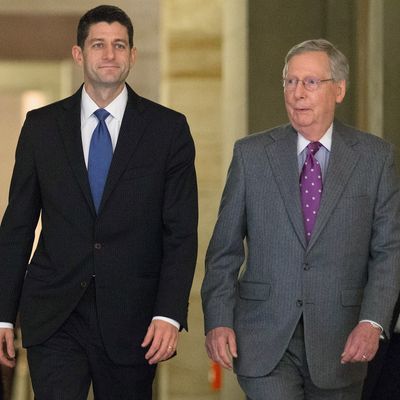
In March 2010, right before the passage of the Affordable Care Act, opponents of health-care reform had spent months spreading falsehoods about its contents and whipping up hysterical predictions about socialism and the end of freedom. In a speech touting the bill, Nancy Pelosi argued that the atmosphere had prevented the public from understanding what the bill actually did, and expressed her hope that the vote would put an end to the fevered atmosphere and give away to a calm analysis of its actual impact:
“You’ve heard about the controversies within the bill, the process about the bill, one or the other. But I don’t know if you have heard that it is legislation for the future, not just about health care for America, but about a healthier America, where preventive care is not something that you have to pay a deductible for or out of pocket. Prevention, prevention, prevention — it’s about diet, not diabetes. It’s going to be very, very exciting. But we have to pass the bill so that you can find out what is in it, away from the fog of the controversy.”
Conservatives made a part of the last sentence — “we have to pass the bill so that you can find out what is in it” — famous, possibly the most famous line from the entire health-care debate. Conservatives turned that sentence fragment into an emblem for their claim that Obamacare was passed in the dead of night through a secretive, rushed, undemocratic process. They claim this even now. Just today, Andrew Ferguson attacks that he calls “[t]he creepy, authoritarian manner in which the legislation was passed,” and Wall Street Journal columnist Kimberley Strassel claims, “Senior Democrats crafted ObamaCare in lobbyist-filled backrooms, forgoing hearings, markups, even input from their own colleagues—much less Republicans.”
This is a bizarre description of a bill that spent a year working through Congress, eventually passing numerous committees, two full House majority votes, one Senate supermajority vote and, in fact, many, many, many hearings. While the law did use a budget-reconciliation bill to enact minor fiscal adjustments, a maneuver that Republicans decried as akin to a death blow to the Republic, in fact its major provisions all received 60 votes in the Senate. The bill was evaluated by the independent Congressional Budget Office, and the projected premium levels in the new exchanges turned out to be accurate, and its predictions of overall federal health spending turned out to be too pessimistic, as the federal government is now spending less on health care with Obamacare than it was projected to spend without it. The bill was enacted in a democratic, deliberate, transparent, and excruciatingly slow fashion.
But the claims that conservatives have falsely made about passing Obamacare provide a true description of the Republican plan to undo it. They are rushing through a bill to repeal it with maximal speed, and no public deliberation. That might be defensible if Republicans had promised the public that electing them would mean simple repeal and a restoration of the health-care system as it existed before 2010. The conservative health-care journalist Philip Klein laments that Republicans are “having a tough time stating a simple truth, which goes something like this: We don’t believe that it is the job of the federal government to guarantee that everybody has health insurance.’”
A small-government conservative party with Klein’s honesty would have made the case that they simply don’t believe the federal government has a responsibility to assure access to medical care for all. The argument framed by Klein does describe the actual policy agenda of the Republican Party, which has worked for years to eliminate or minimize the government’s commitment to expanding health coverage. But Republicans haven’t run on a promise anything like this. Instead, they have insisted since the outset of the debate that they, too, wanted reform. Donald Trump repeatedly promised that his health-care plan would “take care of everybody.” “We don’t want anyone who currently has insurance to not have insurance,” says senior Trump adviser Kellyanne Conway.
So how do they solve the problem? By promising that after Obamacare is repealed, and only then, they will show the country the wonderful system that will replace it. “We have a plan to replace it. We have plenty of ideas to replace it. And you’ll see as the weeks and months unfold, what we’re talking about replacing it,” promises Paul Ryan. Asked if his plan will cover everybody, Ryan demurs, “Look, I’m not going to get ahead of our committee process. We’re just beginning to put this together.” Ryan insists they have a plan, and also insists he cannot describe the plan because it is just beginning to take shape. The “plan” exists rhetorically for the purposes of assuring people there is a plan. But Ryan and his party are unwilling to produce anything that can be compared to the status quo.
Republicans say you have to vote to wreck the status quo before they will tell you what comes next. That is why they are rushing a repeal bill through, without any hearings or deliberation, or public accountability about their plan. All the untrue things they said about the passage of Obamacare are true of the passage of their plan. After screaming about the use of a filibuster-evading reconciliation bill to pass minor changes to Obamacare, Republicans plan to use reconciliation for the entirety of their repeal. It is a naked abuse of the legislative process. You have to pass their bill to find out what’s in it.






























